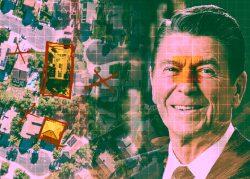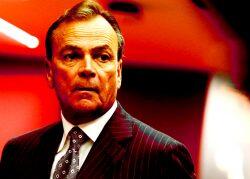This won’t start off about real estate but it will end there — like so much of life.
At the Shed in Hudson Yards, “Straight Line Crazy” is enjoying a sold-out run of months, if not longer. It is the story of Robert Moses, who outfoxed every politician in New York to create a proprietary stream of public money that financed his role as the city’s lynchpin builder from the 1920s into the 1960s.
The play, in my view, is a failure despite the star power of Ralph Fiennes, who plays Moses. It skips too much ground too lightly, leaves out fascinating aspects of Moses’ career, falls into a cartoonish caricature of New York Gov. Al Smith — who deserves better — and wraps up with a wholly unsatisfactory lecture that reflects the cloying nature of political discourse in America today.
All told, it is a sugar buzz of performances spinning around what ends up as empty calories of dramatic tinkering.
The sum total is frustrating because a number of well-crafted lines offer an astonishing reminder that Moses’ character contained bits and pieces that can be found in other larger-than-life achievers of good and bad who have followed.
“I despise incarceration,” Moses says at one point, making him a forerunner of everything from Black Lives Matter to the Democratic Socialists of America.
“It’s not clever to splash around and not move,” he sniffs — and doesn’t that sound a bit like Elon Musk explaining why he put administrative assistants on the production line to meet a Tesla production goal?
“People don’t know what they want until they have it,” he declares, leaving us to wonder how he and Steve Jobs might be getting on in the afterlife.
“When a project is large enough it boggles the mind, and when the mind is boggled the pockets are open,” goes Moses, and if you closed your eyes you might think you caught Donald Trump.
“If I align myself with virtue, I can do whatever I want,” he says, offering an aphorism that one can imagine coming from the likes of Rep. Alexandria Ocasio-Cortez or Sean Hannity.
We end up on real estate thanks to a line Moses spouted about changes afoot in the 1920s, as the average work week dropped to 45 hours and newfangled inventions eased daily chores and allowed the masses to loosen their bonds to factory and field and set about a new occupation.
“This new occupation is called leisure,” Moses says, “and one day it will be as popular as work.”
Read more



Yes, it would be several decades before the blue-collar crowd would move up another few rungs to create whole new industries based on leisure. But he was on the right track, putting his finger on the quickening pulse of America as it developed a great middle class.
Industrialization had brought a big turn to American life, and Moses understood right off the bat that mobility was at its heart and the automobile would fill its heart’s desire.
Allow a small shift in perspective and imagination, however, and Moses also could have been talking about work-from-home and the changes wrought by digitization when he calls out the new occupation of the day.
Who will see whatever changes the Digital Revolution will bring to work and office life as clearly as Moses saw what the Industrial Revolution would bring to factories and fields? Who will get to the heart and heart’s desire of post-pandemic life?
Who will dare build on the vision?
That person might emerge as New York’s next Power Broker — a notion offered with respect to Robert Caro.
